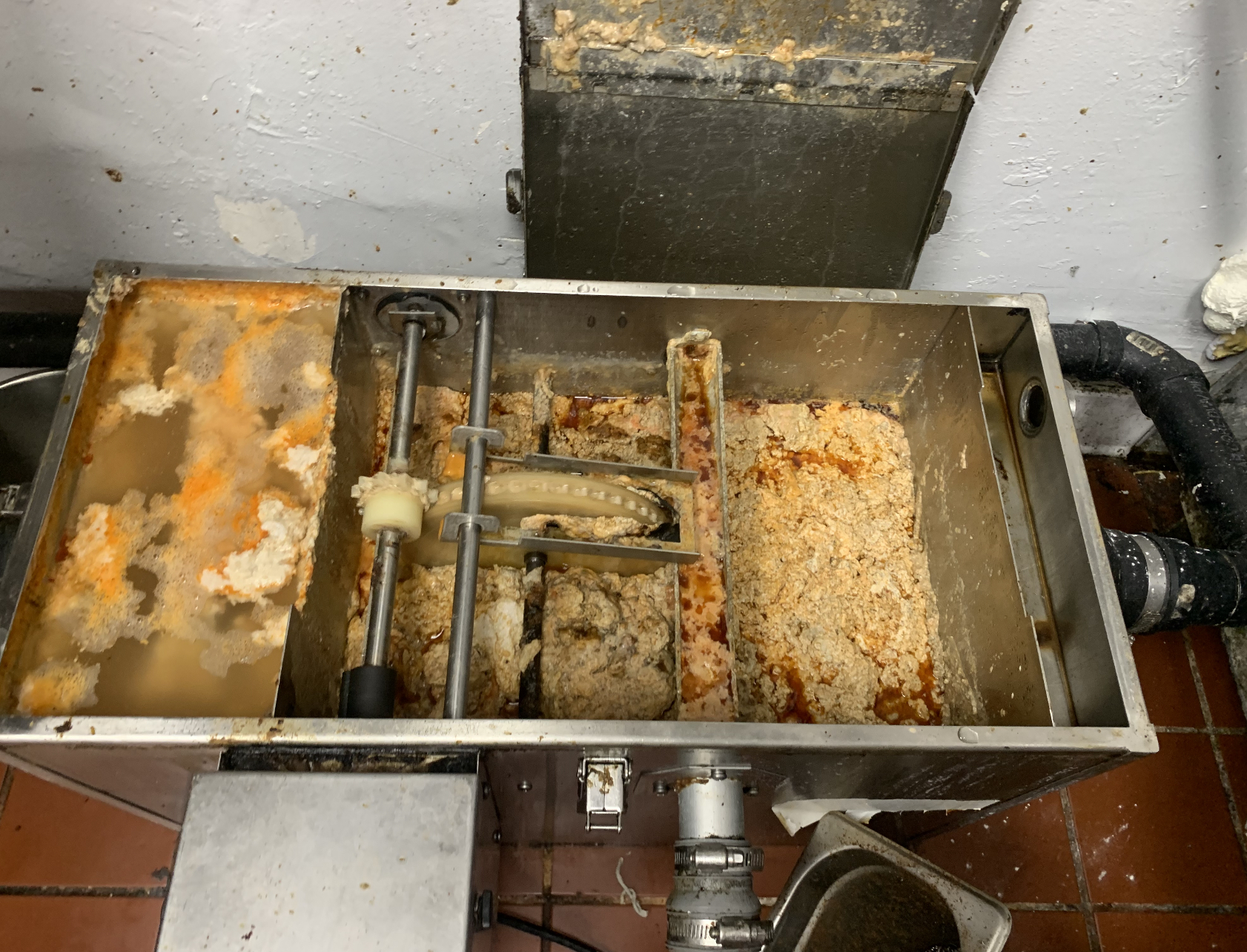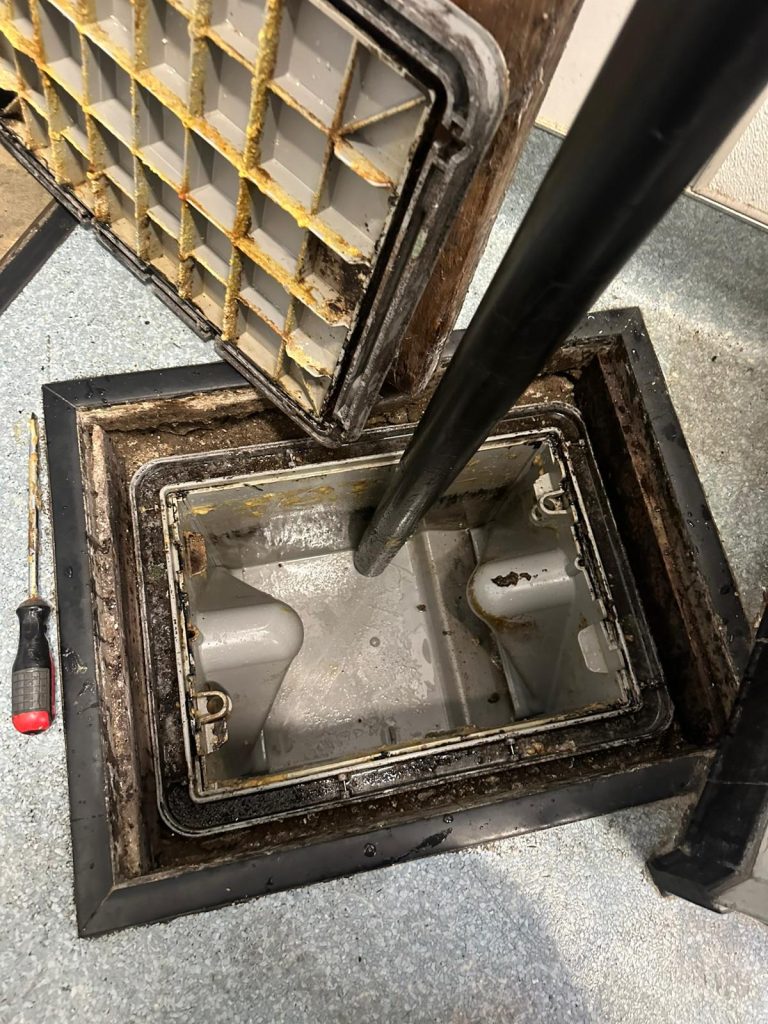Services
Grease Trap Cleaning

The grease trap is a plumbing device, demands regular maintenance to ensure optimal functionality. These grease and food waste recovery devices are used in commercial kitchens catering to large volumes of customers, these traps intercept FOGS (Fats, Oils, Grease, and Solids) generated during food preparation. Preventing these substances from infiltrating the main sewer line is crucial, as they can lead to clogs, blockages, and disruptions in the city’s water supply system. Moreover, they pose a significant threat to natural water resources if left uncontrolled, underscoring the critical role of grease traps.
Typically located beneath kitchen sinks, positioned between the main sewer line and the sink pipe, grease traps intercept wastewater before it enters the main drainage system. The trap’s ingenious design facilitates the separation of FOGS into distinct layers. Grease, being less dense (approximately 10 to 15 percent less dense than water), rises to the top layer, while solids, heavier in nature, settle at the bottom layer. The filtered wastewater in the middle layer is then released into the main sewerage system, employing this straightforward yet effective mechanism.
A grease trap is a device designed to prevent majority of fats, oils, grease, and solids (FOGS) from entering the sanitary sewer system. It is essential for all food service establishments to have either a grease trap or a grease interceptor to operate their commercial kitchen. Cities throughout Los Angeles and Orange County, these devices are regulated to be pumped and cleaned every 30 – 60 days or as needed to ensure FOGS waste does not exceed 25%. The cleaning process requires specialized equipment, and the disposal of the waste necessitates a specific license.
Choosing The Grease Co. means partnering with a reliable, eco-conscious waste management provider. We offer prompt grease trap cleaning, used cooking oil recycling, and compliance support to keep your business running smoothly. Our team is experienced, licensed, and committed to sustainable practices that benefit both your kitchen and the environment. Trust us for professional, hassle-free service tailored to your specific needs.
Modern equipment enhances efficiency and precision across various industries, revolutionizing how tasks are performed. High performance vacuum equipment with high CFM.
Skilled professionals with specialized training handle cleaning and maintenance, ensuring optimal grease trap performance. Our Professional Technicians Will Thoroughly Clean Your Grease Trap & Grease Interceptor.
Use of environmentally safe products prevents harmful chemical buildup while maintaining hygiene standards.
Regular service schedules help prevent unexpected issues, keeping your grease trap functioning smoothly.
Regular maintenance of grease traps is essential, as it not only prevents backups, overflows, and citations but also protects against potential damage like deterioration and corrosion of the device. Most grease traps are constructed from steel. Over time, the buildup of trapped FOGS can break down and produce sulfuric acid, a highly corrosive substance that can damage the steel walls of the tank, leading to costly plumbing issues.
To avoid these problems:
Schedule regular cleanings to prevent FOGS accumulation
Minimize the risk of blockages
Ensure effective grease trap operation
This proactive approach will keep your plumbing and business running smoothly without interruptions.
Grease traps are designed to filter fats, oils, grease, and food solids (FOGS) that originate from commercial kitchens. These substances flow through the main grease line into the grease trap, and then from the trap into the sanitation line. By capturing FOGS waste, these traps help ensure smooth drainage into the sewer system, preventing backups and overflows.
Like any kitchen equipment, grease traps require regular maintenance, including pumping and cleaning, to operate effectively. Failure to clean them can result in FOGS accumulation exceeding 25% of the trap’s capacity, leading to slow drains, backups, and unpleasant odors that can negatively impact both the kitchen and dining environment—an issue that no food service establishment wants to face.


Regular inspection of inlet and outlet baffles ensures optimal system performance and prevents issues.
Efficient disposal of fats, oils, grease, wastewater, and solids is essential for a clean and sustainable environment.
Responsible disposal: All collected waste is safely hauled and disposed in accordance to regulations.
Comprehensive manifest reports provide detailed insights, ensuring accountability and transparency in all operations.
A grease trap is a device that captures fats, oils, and grease (FOG) from wastewater before it enters the sewer system. It is necessary because FOG can solidify and cause blockages in pipes, leading to plumbing issues and environmental contamination.
A grease trap captures fats, oils, and grease (FOG) from kitchen wastewater before it enters the sewer system. As wastewater flows through the trap, grease rises to the top, solids sink to the bottom, and only clean water exits into the drain. This prevents clogs and helps protect plumbing and municipal systems.
Grease traps should be cleaned every 30 to 60 days or when its content reach 25% FOGS waste, depending on usage, size, and local regulations. High-volume kitchens may require more frequent service. Regular cleaning prevents blockages, foul odors, and regulatory violations, ensuring smooth operation and environmental compliance.
Grease traps are regulated by local city or county health departments, wastewater authorities, and environmental agencies. Businesses must comply with these regulations to avoid fines and ensure proper waste disposal. Requirements vary by location, so it’s important to follow your municipality’s specific guidelines.

We Are Food Servicing Establishment Kitchen Grease Trap & Interceptor Cleaning, Oil Recycling, And Plumbing Experts In California Dedicated To Serve You.